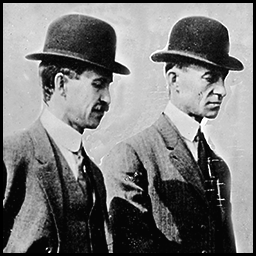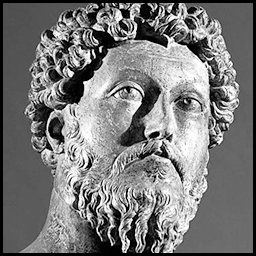
Monthly Archives: January 2023
33 — Wilbur and Orville Wright
a.k.a: Will and Orv
Occupation: Inventors
Born: 1867 & 1871
Died: 1912 & 1948
Brief Description:
The Wright brothers, Orville and Wilbur, were American inventors and pioneers of aviation. They are credited with designing and building the world’s first successful airplane, the 1903 Wright Flyer.
The brothers were born in Dayton, Ohio, Orville on August 19, 1871, and Wilbur on April 16, 1867. They were the sons of Milton Wright, a bishop of the United Brethren Church, and Susan Catherine Koerner Wright. Growing up, they were fascinated by mechanics and flight. They built and flew kites and gliders, and read everything they could find about the subject.
In 1892, the Wright brothers opened a bicycle sales and repair shop in Dayton, which they used as a base for their growing interest in flight. They began experimenting with gliders in the late 1800s, and eventually built their own wind tunnel to test wing designs. They studied the works of other aviation pioneers such as George Cayley, Otto Lilienthal, and Octave Chanute, and began to develop their own ideas about how to achieve powered flight.
In 1900, the Wright brothers built and tested their first glider at Kitty Hawk, North Carolina, a location they chose for its steady winds and soft sand dunes. Despite initial setbacks, they continued to improve their designs, and in 1903 they were ready to attempt powered flight. On December 17, 1903, Orville piloted the first flight, which lasted 12 seconds and covered 120 feet. Wilbur piloted the fourth and final flight of the day, which lasted 59 seconds and covered 852 feet.
After their historic flights, the Wright brothers continued to improve their designs and made several more flights in the following years. They eventually opened the Wright Brothers Flying School in Montgomery, Alabama, and began selling airplanes to the military and other customers. They made their first public flight in 1908 at Huffman Prairie, Ohio, and in 1909, they made their first flight in Europe.
The Wright brothers’ contributions to aviation were significant and far-reaching. They developed the three-axis control system, which is still used on airplanes today, and their designs served as the basis for future aircraft. They received numerous accolades and honors during their lifetime, including the French Legion of Honor, and were inducted into the National Aviation Hall of Fame in Dayton, Ohio, in 1973.
Orville Wright died on January 30, 1948, and Wilbur Wright died on May 30, 1912, both in Dayton, Ohio. Their legacy is still celebrated today as they are considered as the fathers of modern aviation. The Wright Brothers’ achievements were not only a technological breakthrough but also a significant moment in human history as it opened up a new era of transportation and communication.
Why they’re on the list:
The Wright brothers were fascinated by flight since their early age when their father brought home a toy helicopter. Wilbur and Orville played with it until it broke and then built their own. Their experience with the toy was the spark of their interest in flying.
At the time, many people and institutions with much higher budgets were also interested in building the first successful airplane. But what gave the Wright brothers an edge was their willingness to build and try out many different prototypes, adjusting and improving them each time.
At a time when flight was generally believed to be impossible, these two unassuming brothers were confident enough and passionate enough to prove to the world that humans could indeed fly. I have a few personal projects of my own that I am passionate about and that I hope to achieve one day and the Wright brothers’ story is an inspiration and an example to follow in the pursuit of these seemingly unattainable goals.
Quote Orville Wright
Quote
“Isn’t it astonishing that all these secrets have been preserved for so many years just so we could discover them!”
— Orville Wright
Image
34 — Marcus Aurelius
a.k.a: Imperator Caesar Marcus Aurelius Antoninus Augustus
Occupation: Emperor
Born: 121
Died: 180
Brief Description:
Marcus Aurelius was born in Rome in 121 AD. He was the son of a Roman aristocrat and was well-educated in philosophy and literature. He became interested in Stoicism, a school of thought that emphasized the importance of living in accordance with reason and virtue.
As a young man, Marcus became close friends with the future emperor Antoninus Pius, and he later married Antoninus’ daughter, Faustina. When Antoninus became emperor in 138 AD, he appointed Marcus as his co-ruler, and upon Antoninus’ death in 161 AD, Marcus became the sole ruler of the Roman Empire.
Marcus Aurelius is best known for his role in leading the Roman Empire during a time of political and military turmoil. During his reign, the empire was threatened by invasions from barbarian tribes and was also plagued by natural disasters, including a series of devastating plagues. Despite these challenges, he remained committed to his philosophical beliefs and sought to apply them to the governance of the empire. He was known for his fair and just rule, and he worked to improve the lives of his subjects by building public works, such as aqueducts and roads, and by establishing charitable institutions.
In addition to his political accomplishments, Marcus Aurelius is also known for his writings, which include the famous “Meditations,” a series of philosophical reflections on the Stoic way of life. In these writings, Aurelius reflects on his own experiences and struggles and offers wisdom and guidance on how to live a virtuous life.
Marcus Aurelius is remembered as a wise and just ruler who was deeply committed to living a virtuous life. His philosophy has had a lasting influence on Western thought and continues to be studied and admired to this day. He is often considered one of the greatest philosophers in history and is revered as a symbol of courage, wisdom, and integrity.
Why he’s on the list:
I could talk about Marcus Aurelius’ virtues or his character or some of his achievements or go in depth into some of his thoughts from Meditations. And I do like the Stoic philosophy in general. But none of those are the real reason he’s on my list.
When Marcus Aurelius wrote his Meditations, it didn’t have a title (at least not that we know of). It probably wasn’t even meant to be published and was later simply referred to as Marcus’ writings to himself.
Marcus likely didn’t care about posthumous fame either. As he says: “People out for posthumous fame forget that the generations to come will be the same annoying people they know now. And just as mortal. What does it matter to you if they say x about you, or think y?
This is similar to my list of portraits. Even though I am writing my portraits publicly, I’m writing them for myself as a form of introspection. If they’re public, it’s only because my readers give me the motivation to actually write them down instead of keeping them as mere thoughts and for that, thank you. =)
Quote Marcus Aurelius
Quote
“Is your cucumber bitter? Throw it away.
— Marcus Aurelius
Are there briars in your path? Turn aside.
That is enough.”


